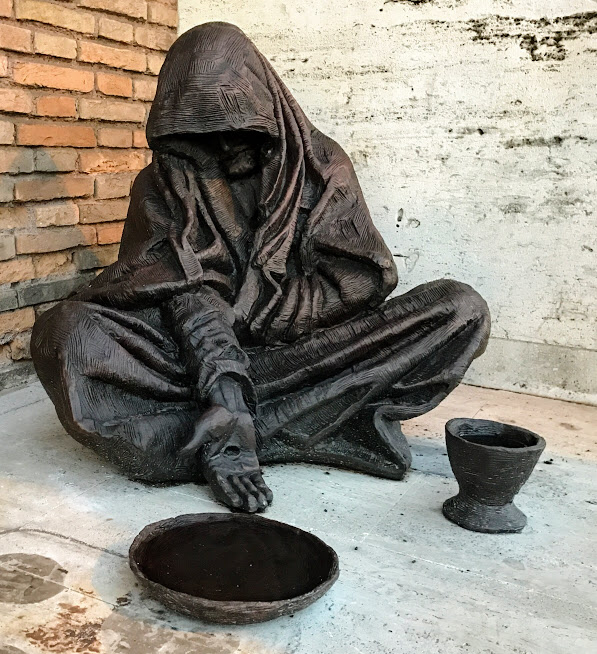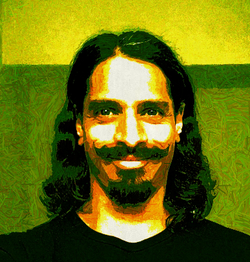A long time ago in a kingdom far away, there was a Good King. In this kingdom, they called him "The Caliph" as he lived in a strange city that developed in the desert of ancient Arabia. This Caliph was the son of a very respected King and when it was his turn to ascend the throne, he wanted to be as good a king as his father.
Each day as part of his royal duties, the Caliph would sit on his throne and help the court settle disputes among his citizens. Since he was a fair and just king, he would listen to both sides of the dispute before asking each person involved to exercise mercy and forgiveness after which he would pass his royal judgment.
Once he saw a rich merchant bring suit against an uneducated poor thief. The merchant argued that if the thief is allowed to go without penalty, then he would return to his life of crime, but the thief with tears in his eyes begged mercy from the Caliph who claimed that he only stole to secure food for his family. The Caliph, being a prudent king, asked for the court to reconvene in a month’s time so that each party would have a chance to cool off. He gave them each some food and sent them on their way.
The Caliph knew that if he was too forgiving that his kingdom would suffer from crime as thieves would not respect the consequences, and if the Caliph was too harsh in his judgment then his people would live in fear and not trust one another. So after thinking of a plan, the Caliph along with his most trusted pair of bodyguards dressed up in tattered cloaks and made their way out of the palace into the streets of his kingdom.
At once, he witnessed the nature of his people as they could not identify him in his ordinary costume and treated him as they would any other. Some welcomed him with kindness and before leaving the Caliph ordered his servants to secretly bestow sacks of treasure for them to find.
Others were rude and dismissed the Caliph as a peasant or a beggar from their stores who might deter customers from making purchases. The Secret king took note of these individuals, but left without protest or curse. It was during one such an out-casting when the Caliph heard the whistle of one of the beggars who witnessed the spectacle.
The beggar invited the Caliph and his friends to join him for supper in an alley which consisted of a loaf of bread and some water. The Caliph was moved by the beggars generosity and offered to share some wine that one of his guards had carried with them. During the course of the meal, the Caliph recognized the beggar from his court appearance earlier in the month, although he was dirty from living on the street and his robes were torn.
The Caliph asked him where his family was, but the thief looked down in sorrow and did not answer. Once again, the king asked about his family, to which the beggar replied, “I was born on these streets, my mother is the sky, my father, the earth, and my brothers: those of whom share my parents home. Tonight, you are my family.”
Moved by his testimony, the Caliph removed his cloak to reveal his true form. At once, the beggar fell to his knees and asked for forgiveness. The Caliph laughed and picked him up with an embrace. “This night, we are brothers”, the king spoke. “You are welcome to come live as my brother in the palace, where you will be waited on by servants hand and foot. You will never be hungry again.”
The beggar gratefully accepted and went at once with the Caliph’s servants to the palace. But the Caliph was not finished, he wanted to see the rest of his kingdom, and so for the rest of the month he continued to sneak out of the palace in tattered robes to test the character of his people.
On the last day before his court appearance, the Caliph happened upon the rich merchant who ran a local market. He was working with his children who ran each food cart. The Caliph had managed to beg enough change from passersby before asking to buy some bread to eat. The merchant’s daughter who ran the bread cart counted the change but it was not enough, and since the merchant could see the transaction he came over to ask, “how short is our customer?”. The daughter replied, “about half father”, to which the merchant picked up the loaf, broke it in half, and offered it to the beggar. The Caliph in disguise was pleased and thanked the merchant as he parted ways.
The next day, both the former beggar, now wearing clean robes, and the merchant gathered before the royal court. Once again, the Caliph asked if the merchant still wanted to bring charges against the thief. The merchant was no longer upset and asked that nobody be punished, but still wanted the king to help deter thievery which takes food from his children’s table.
The good king thought for a few minutes and offered this, “Each time a theft occurs, make note of it, but do not harm the offender and I will fairly compensate thee. The thief may be stealing to feed his family and as a father you must teach your children fairness and justice. There is no right or wrong here, bring your concerns to me and I will deliver justice.”
Each party left the royal court happy with their judgment and went back to their homes. Then stories of the Caliph’s mercy and justice became legendary and his kingdom flourished. His citizens knew of the king’s unusual habit of sneaking out of the kingdom in disguise and began to treat strangers with kindness and compassion and soon crime ceased and compassion increased.
The End.



 RSS Feed
RSS Feed
